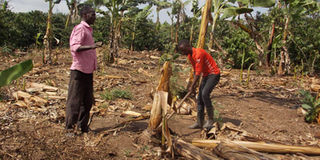Ssozi teaches crop hygiene for a living

Ssozi explains to a farmer how to plant bananas. Photo by Michael J Ssali
What you need to know:
Francis Ssozi earns his living by teaching fellow farmers and women groups how to take good care of their banana gardens for maximum production, writes Michael J Ssali.
Francis Ssozi of Katooke Village, Kiwangala Trading Centre in Lwengo District has had a keen interest in growing bananas since his school days.
As a teenage student at Nakasoga Secondary School in Kyotera District he would often stand at the verandah of the house at his home and gaze at the banana trees growing in the garden.
“I was often puzzled to note that the banana plants near our house looked strong and healthy and the others far away from the house looked yellowish and not so vigorous,” he told Seeds of Gold. “One quick observation I made was that since we were keeping chicken on free range, they were always scratching the ground and taking away the mulch of dry leaves and grass from the banana stems. Yet further away where the chickens did not go the mulch was intact but the crops were yellowish and rather weak,” says Ssozi.
Farming skills
Ssozi, who ended his formal education in Senior Three, is quick to point out that he did not pick his farming skills from school or from any agricultural institution.
He has been doing a lot of personal experimentation and observation on his own garden to gain the knowledge. Today he earns his living by teaching fellow farmers and women groups how to take good care of their banana gardens for maximum production.
Teaching crop hygiene
“A lot of farmers lose money buying pesticides to fight banana weevils and pests,” says Ssozi. “Failure to observe crop hygiene has led to high cost of production and loss of entire banana gardens to disease,” he says.
The 40-year-old father of six heads a team of 19 men known as Muwangala Foundation, which is regularly contracted by farmers in the district to rehabilitate their banana gardens. It is a job he has done for the last 20 years. “The farmer pays us a third of the amount of money that we have to be paid at the end of the job,” Ssozi said. In a good season, Ssozi takes home about Shs10m from his tutorial efforts.
Working
“Then we begin work on the garden, which normally takes a full year. The rest of the money is paid in instalments as we proceed with the work. We have not yet had any bad debts mainly because within just a few months the farmer begins to notice positive changes and feels prompted to pay,” he says.
He further disclosed that often he has several contracts running at the same time and his team has to be divided up to attend to the work in all the different gardens. “What we mainly emphasise is that there should be free space of about two feet around the banana stem, where the ground is not covered by mulches, dung or coffee husks. This practice keeps the nearest roots of the banana plant in the ground to keep it strongly held in the ground.
The presence of grass or any other mulch material near the banana stem facilitates multiplication of pests which some farmers kill with the use of expensive pesticides. Yet when the space is left bare the pests are kept away. The banana stem stands strong, able to withstand strong winds, and is capable of holding and supporting heavy bunches of bananas. The farmer should also avoid keeping dry banana leaves and fibres on standing plants. ”
Ssozi’s advice to farmers
He adds that farmers should mulch with organic materials such as grass or dry maize stalks, bean residues and other such materials.
He further says farmers have to limit the number of shoots on each banana plant to just two in what he calls, ‘daughter and granddaughter’ arrangement. According to him many farmers have lost their entire banana gardens and claimed they were attacked by the much feared banana bacterial wilt disease whereas in reality it is because they did not observe simple crop hygiene.
“We do not just work on the farmers’ gardens, we also teach them the skills,” he revealed. “Many of my team members have left and gone ahead to undertake their own contracts having mastered the skills. Sometimes I am invited to give talks to groups of women about banana growing skills for which I charge money depending on how far they are located from my home,” says Ssozi.
What others say
Henry Kaweesa, the area agricultural services extension officer has said most of what Ssozi points out and does is helpful to the farmers.
“However, in the fight against banana bacterial wilt, besides practicing crop hygiene farmers must be careful with the tools they use. They have to be on the lookout for diseased plants and avoid using the same sharp tools on both the diseased and healthy ones.”
Twenty six-year-old Expedito Kilwaana, who has been working under Ssozi for about a year says that he wants to use the acquired skills to establish his own banana garden.
Mugagga Matovu of Kanku Village ,at whose garden Muwangala Foundation is currently working, said: “I am already noticing big positive changes in my garden which I had given up as gone. I am learning new skills and I believe all my neighbours will be copying from me.”




